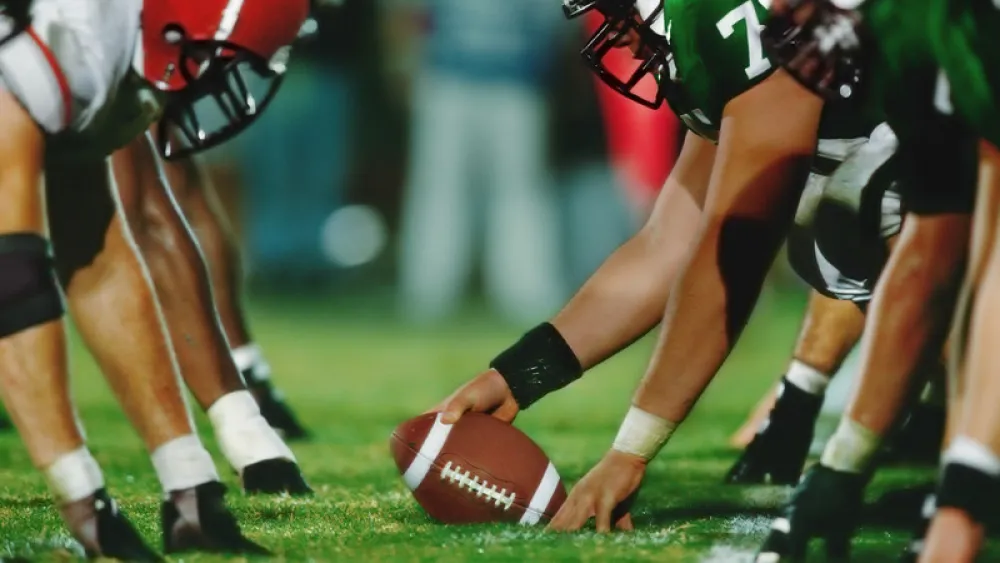Today's Medicine
Spotting Common Concussion Symptoms and Creating a Culture of Safety


Friday night football games come with helmets and hard hits. Volleyball has powerful hitters and defensive players diving to make plays on the hardwood court.
Our favorite fall sports are filled with chances for concussions. And while we often associate concussions with competitive athletes, they can happen to anyone.
Regardless of the cause, a concussion can have potentially dangerous consequences.
How concussions happen
A concussion is a traumatic brain injury that follows a blow to the head. The sudden movement can actually cause the brain to bounce around or twist in the skull, causing chemical changes in the brain. A blow can even stretch and damage brain cells.
While athletes are at risk, concussions are also a common result of car accidents and falls. Have you ever hit your head on a countertop or furniture? Blows to the head like that have the potential to cause concussions.
Concussion symptoms
A concussion is diagnosed by recognizing symptoms shortly after a blow to the head. Imaging of the head often isn’t helpful. Every concussion presents a little differently, but there are some similarities.
Common concussion symptoms include:
- Headache or “pressure” in head
- Nausea or vomiting
- Balance problems, clumsiness or dizziness
- Double or blurry vision
- Sensitivity to light or noise
- Feeling sluggish, hazy, foggy or groggy
- Confusion, forgetfulness, or concentration or memory problems
- Just not “feeling right,” or “feeling down”
- Loss of consciousness (even briefly)
- Changes in mood, behavior or personality
- Sleeping more or less than usual, and/or having trouble falling asleep
 How to respond to a concussion
How to respond to a concussion
So you think you or your child may have a concussion? What should you do?
The most important thing is to take it seriously. During athletic competition, the rule of thumb is: When in doubt, sit out.
Once a concussion is suspected, prompt evaluation by a medical professional is important. That might be a sideline assessment with an athletic trainer, an emergency room visit for severe symptoms or a timely visit with your Methodist Physicians Clinic primary care provider. A medical professional will recommend the appropriate next steps, but you absolutely should not return to regular activities or sports until you’ve gotten a professional’s clearance.
Recovery is unique to each individual and could take a couple weeks or longer. Generally, treating a concussion correctly will shorten the course of recovery, while trying to fight through it can prolong it.
Create a culture of concussion safety
How can you guard against a concussion?
Start by teaching children and teens that they must wear helmets for certain activities. This will help lower the chances of the most serious types of brain or head injuries. Remember, there is no “concussion-proof” helmet. Even with a helmet, it’s important to avoid hits to the head.
Go further by committing to make safety a priority. Here’s how:
- Talk to coaches about ways they are lowering the chances of a player getting a concussion.
- Ensure that your child follows the coach’s rules for safety and the rules of the sport.
- Teach your child the signs of a concussion.
- Emphasize to everyone the importance of reporting concussion symptoms.
- Allow your child the proper time to recover from a concussion, and offer support during the recovery process.
Your commitment to safety should extend to everyday activities. Some examples:
- Insist that your kids wear helmets while riding bikes, skates, scooters, etc. Don’t forget about horseback riding, skiing and snowboarding.
- Whether it’s using a seat belt, car seat or booster seat, make sure all vehicle passengers are properly restrained.
- Make your home safe for all ages. Use safety gates to keep young children away from stairs. Install handrails along stairways and grab bars in bathrooms.
Help when you need it
There are numerous online resources to help you prevent and identify concussions, including the Centers for Disease Control and Prevention. But they are no substitute for a professional’s assessment.
If you think you or your child may have sustained a concussion, start the conversation early – before it’s too late.


